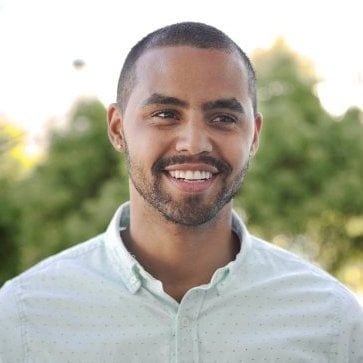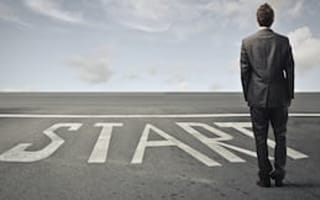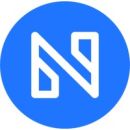
Everyone remembers the humbling experience of their first "real" job. Mine was working a grill at our local pool's concession booth — I got fired. My older brother and I wanted to see who could punch a bigger dent into the walk-in freezer door. Unfortunately, the Centennial Pool Management Team wasn't as intrigued by that feat of strength.
I learned a thing or two from that mistake but time will tell what role it plays in influencing my career. To learn where verified success stems from, we talked with six CEOs to find out what they learned from their first job and how those lessons still resonate today:
 Greg Cohn, CEO
Greg Cohn, CEO
What was your first job? Was it something you were passionate about?
I did lots of things when I was young: door-to-door sales of holiday cards, paper routes, lawn mowing, babysitting, that kind of stuff. But my first "real" job was as a data tape librarian at a data storage company — picking and sorting backup data tapes at an offsite data storage vault. In the days before cloud storage, companies like banks or government agencies would put racks of tapes on trucks and drive them back and forth to an offsite vault every day. You could probably go back and measure that in megabytes per mile per hour and it would be pretty laughable how inefficient that was. But that's what people did when I was a sophomore in high school.
What lessons did that job teach you?
I was a smart kid who could hold large numbers in his head, so I was really fast at pulling and sorting the tapes when the orders came in as large printouts of numbered tapes. I could fill up my arm with them. Most of the guys who worked there were driving the trucks and much older and wore shorts and UPS-driver type outfits, and I was this nerdy kid in Gap khakis who was always two steps ahead of them in organizing the deliveries. They high-fived me and I thought they were cool dudes, and sometimes I went on delivery runs with them. It was really the first time I experienced the difference between being in a position to use my brain for work, side-by-side with people who had to use their bodies for work. Guys worked up a sweat (and sometimes had accidents and broke body parts) in that job, while I hung out in the air-conditioned vault most of the time.
What was the hardest obstacle you faced?
They "promoted" me to drive one of the routes — a very short but important one — after a regular driver quit. I took it because it seemed exciting and because it needed to be done, and because I wanted to do the right thing as part of the team (and also because they paid me a bunch extra). But it was intense and I was really in over my head, maneuvering this big truck around a sketchy part of Baltimore at night, pushing this refrigerator-sized tape cart up and down ramps. I once bumped the cart into a sensor and set off a Halon fire extinguisher in a company's data center, which I think cost us $5,000. Another time, I got stuck in a snowstorm in the truck, which I felt I couldn't abandon because there was sensitive client data in the cargo. It was pretty stupid in retrospect but I definitely passed the commitment test.
What leadership values did you learn and how did it shape your path to becoming a CEO?
One of my core values as a leader is to be willing to do anything and everything in the office, whether it's washing the dishes, making a lunch run, running a QA routine, or handling customer service tickets. Demonstrating there's no job that's beneath you goes a long way when you're delegating at other times, and it's a way of communicating that you place a high value on the time of other contributors on the team. More generally, I believe people dig the deepest and contribute their best work when they feel like they're in an important role on the team, and when they believe in the mission they're on.

 Kyle Hill, CEO
Kyle Hill, CEO
What was your first job? Was it something you were passionate about?
My first job was mowing lawns for my neighbors. It was called "K&H Lawn Service" which didn't make any sense because K and H were the same person (me), but I saw law firms do it so I thought it was cool. I was 10 years old. My core differentiator was that I would edge the lawn and blow away the loose grass with a blower, all for 15 bucks.
What lessons did that job teach you?
There were days I didn't feel like working, and I had to do it anyways. So I started learning how to entertain myself, such as making CD playlists for myself to listen while I worked or cutting the lawns in different patterns (horizontal, diagonal, even circular). I also learned how to up-sell additional services (like raking leaves and hedging the bushes for extra cash).
What was the hardest obstacle you faced?
When it rained, I couldn't mow any lawns. And when my lawn mower broke, I had to learn how to repair it. And when I was out of gasoline, I had to ride my bike to the gas station. One time I hit a rock with my mower and it dented the neighbor's car. There were a lot of maintenance costs and unseen expenses that I didn't account for initially.
What leadership values did you learn and how did it shape your path to becoming a CEO?
My lawn mowing business taught me how to be accountable, how to market myself, how to differentiate, how to negotiate and up-sell services and how to create meaningful value for other people. I also learned how to be frugal with my money — every dollar counts!

 Eli Portnoy, CEO
Eli Portnoy, CEO
What was your first job? Was it something you were passionate about?
My first job was a business analyst for a strategy consulting firm. When I applied for the job I envisioned a glamorous position where I would travel the world working on some of the hardest business challenges for Fortune500 companies. The reality was that I spent 14 hours a day rearranging powerpoint slides and making them look pretty.
What lessons did that job teach you?
I learned a lot on my first job. I learned important lessons like how much attention to detail matters, how important professionalism is, and how hard it is to advance in corporate america. I also got a lot of functional experience and became quiet good at Excel and making power point presentations look pretty.
What was the hardest obstacle you faced?
The travel was tough. Five days a week working for 14 hours and then shuttling to a new city every night is no fun. It sounded amazing when I first got the job, but it got old pretty quickly.
What leadership values did you learn and how did it shape your path to becoming a CEO?
I learned that what I valued most was being empowered and challenged. Pay, title, and any of the other stuff that I thought I would care about didn't make me happy. What made me value my job was when I was empowered and challenged. I was thrilled when I got real responsibility to try and figure something out. This helped me hone my leadership style which is all about empowering people and giving them real responsibility, real decision making authority, and real responsibility. It doesn't matter if someone runs marketing or if they are an intern, I look to give people projects that they own.
In terms of my own career, I was frustrated enough that I soon left my job and started my first company. If I had loved that job I would never have left and I would never have gotten the startup bug. So three companies later I am extremely grateful for everything I learned as a consultant and even for the thing I didn't like about the job, which pushed me into this entrepreneurial journey.

 Justin Choi, CEO of
Justin Choi, CEO of
What was your first job? Was it something you were passionate about?
I got my first paid job when I was 12. I carried a box of candy door to door, and I learned how to pitch. Selling $4 boxes of candy in the late '80s wasn’t easy. My first real job as an adult was as a desktop publisher; I put together all the marketing materials and catalogs for a small family-run electronics distributor. I was not passionate about it but did it to pay the bills.
What lessons did that job teach you?
I was working my way through school and carrying a full-load of classes. That was tough but not nearly as tough as working full time over the summer. I learned at age 18 that working at a 9-to-5 job that you don’t feel passionate about was demoralizing—I couldn’t suffer through that my entire adult life. I knew at that point that I had to start my own business, which I did at age 20. Outside my own ventures, I’ve never held a professional job since.
What was the hardest obstacle you faced?
I was a one-man show putting together a 100+ page catalog including scanning in images using an old-school hand-held roller scanner to scan in product line art (I’m dating myself here). I worked alone late into the night getting the work done. It was repetitive. I learned to keep myself motivated and gave myself goals to make improvements no matter how I felt about the work. Regardless of how painful the job was, I still wanted to be proud of what I produced. That’s never gone away.
What leadership values did you learn and how did it shape your path to becoming a CEO?
The title may sound glamorous but being a startup CEO means doing all the work that you have to do to drive the company forward versus doing the work that you want to do. It also means carrying the weight of the company’s shortcomings and failures on your shoulders. The buck stops with you. Perseverance, taking pride in my work, and diligence were lessons I learned early on that I’ve carried with me.

 Jerry Jao, CEO
Jerry Jao, CEO
What was your first job? Was it something you were passionate about?
My first (real) job was being a "Sandwich Artist" at Subway while I was a Junior in high school. It wasn't something I was passionate about other than getting a job that I can walk to since I didn't have a car then. I also sold a lot of products on eBay, from gameboy games to comic books (nerdy stuff), and I was really into that. I also finished Calculus BC as a Junior, so I tutored Seniors math and got paid pretty good money for it, but it wasn't a "job".
What lessons did that job teach you?
I think everybody should work at a restaurant, retail, of some sort. My experience at Subway allowed me to see different walks of lives and it was very humbling. I vaguely remembered my shift manager at the time was a college dropout because she had two kids and "life happened", however, she had a great attitude, and was incredibly hard working and took her role seriously and honorably. For example, we would have contests on who can promote and sell the most "avocado add-on" for $1, and I'd always try my best to make $50 a month in that "bonus", and she pushed all of us hard for that. Working at a fast-food chain taught me hard work, taking ownership in everything I do, and customer service, which is incredibly important to being a CEO today.
What was the hardest obstacle you faced?
Never complain about that one "angry customer"! It is REALLY hard not to complain and be frustrated with customers. We tend to expect a lot from others when we are paying. I learned that the hard way early in my life. I believe that just because you are paying somebody for a service of some sort, it doesn't really give you the right to be overly demanding, unreasonable, and not treat others with respect. Working at a fast food restaurant, you see a lot of different types of people. Some are really nice, some take their frustration during a bad day out on you while ordering a sandwich. I'm a pretty happy and optimist guy, and I try my best to not let bad/rude attitudes from customers get to me. More importantly, I used that as a reminder to be kind and respectful to others in the service industry, because I know how HARD it can be.
What leadership values did you learn and how did it shape your path to becoming a CEO?
I learned to always lead through actions and not just words. At Retention Science, I try my very best to lead through examples, I choose to "show" my team what I expect instead of "telling" them. As a leader of a fast growing company, things are always changing, roles and expectations are evolving, and communication is key. I learn to take time to explain things as much as I can. I really care about their growth, so I ask each person what they'd like to learn or get out of their experiences at Retention Science.
I always say to our team, "details matter." I learned that from working at Subway. From the tone of greeting somebody when they walk in, to how you rushed through a sandwich order because others will get mad at you for waiting in line, and how you keep a smile on even if you're stressed. The service industry teaches me a lot, and it's all about paying attention to the details.

 Joanna McFarland, CEO
Joanna McFarland, CEO
What was your first job? Was it something you were passionate about?
My first job was in investment banking. I loved working with a smart group of people who were constantly bringing their A game.
What lessons did that job teach you?
I quickly learned how to assess an industry and a company at both a high level and how to dig in deep in to the metrics to learn more. I also learned a strong work ethic and that there is no shame in grunt work — I spent a lot of time as an analyst faxing (yes, back then we faxed) and copying and getting paged on my pager (this was even pre-blackberry) to come back into the office at 2 a.m. to print and bind decks for a managing director to make a 5 a.m. flight. But I also got to do some really interesting work and helped some companies with acquisition strategies roll-up their industries. I was able to have a seat at the table in boardrooms and observe board meetings and high level strategic discussions. So great learnings came with the grunt work.
What was the hardest obstacle you faced?
The hardest obstacle was learning as much as I could in a short period of time and learning to get confident speaking up with a point of view.
What leadership values did you learn and how did it shape your path to becoming a CEO?
I learned that niceness pays. I would go to the ends of the earth for the Associates and MDs who were took an interest in developing my career and who appreciated the hard work. I also learned to develop relationships from the MDs, down to the guys in the printing room. Being nice meant getting to the front of the line to get books bound which meant getting an extra hour of sleep a night. I learned to ask dumb questions because asking up front and understanding paid far more dividends then pretending to know something I didn't.
Have a tip? Let us know or follow us on Twitter @BuiltInLA








